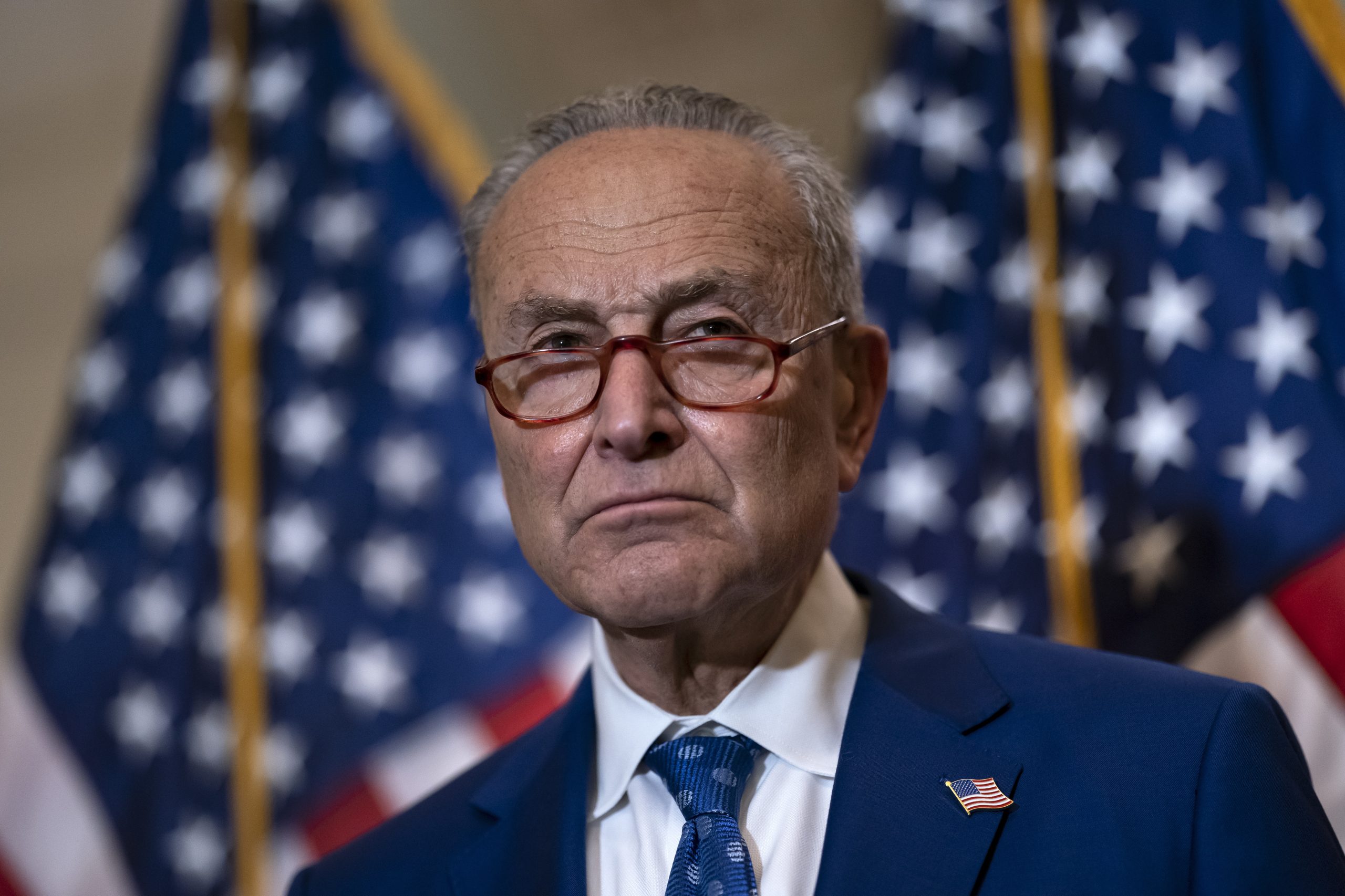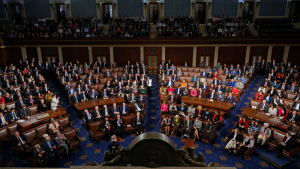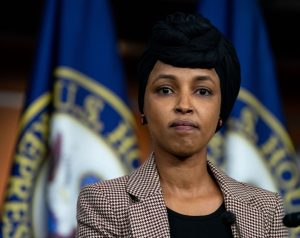Senate Majority Leader Chuck Schumer’s latest proposal to end the ongoing government shutdown is drawing sharp scrutiny from lawmakers and analysts alike, with some suggesting the move may be more about political positioning than genuine compromise.
The proposal, unveiled late this week, arrives on the heels of a strong electoral performance by Democrats in recent special elections — victories that have strengthened the party’s hand but also reignited partisan tensions in Washington.
A Proposal With Political Implications
At first glance, Schumer’s plan appears to be a conciliatory step meant to reopen government operations after weeks of gridlock. Yet according to several observers, including Capitol Hill reporters and Republican lawmakers, the proposal could carry strategic implications that extend well beyond immediate budget concerns.
Punchbowl News reporter Andrew Desiderio noted that one provision of Schumer’s proposal would set the next major budget deadline around the 2026 midterm elections — a move some critics view as a deliberate attempt to frame Republicans as obstructionists during a politically sensitive period.
“Schumer says this is a reasonable offer,” Desiderio posted on social media. “Republicans are almost certain to reject it. One GOP lawmaker just noted that all this does is force Congress to address it around the midterms next year.”
He added, “Dream scenario for Democrats — to be able to talk about health care right before the elections.”
Democrats’ Strong Showing Raises the Stakes
The controversy follows a week of notable Democratic victories in statewide and local elections. The party managed to secure control in Virginia, maintain power in New Jersey, and push through key redistricting efforts in California.
Political analysts say those wins, combined with a strategically timed proposal to resolve the shutdown, suggest that Democrats may be capitalizing on momentum to shape public perception ahead of 2026.
“The timing is what stands out here,” said one Washington-based political strategist. “If you look at when Democrats chose to re-engage on the shutdown talks — immediately after their electoral success — it’s hard not to see a political calculation behind it.”
Shutdown Dynamics and Strategic Timing
The federal government has been in partial shutdown for weeks, with agencies running on limited funding and thousands of federal employees either furloughed or working without pay.
The standoff began over disagreements between the Republican-led House and the Democratic-controlled Senate on spending priorities, particularly on healthcare subsidies and social programs. While both sides have called for a resolution, negotiations have stalled over ideological and fiscal differences.
Now, with Schumer’s proposal on the table, some lawmakers argue that the shutdown itself may have been used as a political instrument — first to galvanize Democratic turnout in last week’s elections, and now to shape the narrative heading into the midterm cycle.
A Calculated Move or a Push for Compromise?
Schumer has defended the proposal as a “reasonable path forward” that balances fiscal responsibility with the need to restore essential government operations. His office has rejected suggestions that the timing or structure of the plan carries partisan intent.
“This is about getting Americans back to work and ensuring that families don’t suffer because of political games,” a Senate Democratic aide said. “Any claims that this proposal is about politics are completely off-base.”
Republican leaders, however, see it differently. They argue that the plan effectively sets up another political showdown at a time most favorable to Democrats.
“Agreeing to this would mean setting ourselves up for another round of brinkmanship right before an election year,” said one GOP senator. “It’s not compromise — it’s strategy.”
Long-Term Political Chess
Chuck Schumer has long been recognized as one of Capitol Hill’s most strategic tacticians. Colleagues and critics alike describe his leadership style as deliberate and often layered with political foresight.
Some Republicans now claim the Senate Majority Leader is deliberately aligning legislative timelines to coincide with election cycles, using fiscal deadlines as opportunities to frame his party as champions of popular issues such as healthcare, education, and social equity.
“Schumer is always several moves ahead,” a former congressional staffer noted. “He knows that controlling the narrative is half the battle — and if that means linking budget debates to election messaging, he’s willing to do it.”
The Broader Political Context
The renewed scrutiny of Schumer’s actions comes at a time when Democrats are facing challenges on cultural and policy fronts, including debates over gender issues, border policy, and crime rates. As those topics grow more divisive, the party’s focus on economic and social safety net policies could serve as a unifying message for voters.
Analysts suggest that positioning healthcare and social spending debates near the midterms could allow Democrats to campaign on themes of compassion, stability, and fairness — framing Republicans as unwilling to support working families.
“Healthcare has always been one of the Democrats’ strongest issues,” said a nonpartisan policy analyst. “If budget talks highlight that in the months before an election, it could shift momentum decisively in their favor.”
A Familiar Political Playbook
While Schumer’s office maintains that the proposal is about governance, history suggests that both parties have used budget and funding standoffs as political leverage. From the shutdowns of the 1990s to more recent fiscal showdowns, strategic timing has often played a role in shaping voter perception.
Still, the criticism now directed at Schumer reflects broader concerns about the increasing politicization of budgetary negotiations. What was once a debate over spending priorities has become, for many, another front in America’s ongoing partisan struggle.
As one senior congressional reporter put it, “The line between governing and campaigning has almost disappeared.”
Looking Ahead
For now, it remains unclear whether Schumer’s proposal will gain traction in the Senate. Republicans have signaled firm opposition, while moderate Democrats have expressed cautious optimism that a version of the plan could eventually pass.
What is certain, however, is that the timing and structure of the proposal will continue to fuel debate — not only about the shutdown itself, but about the broader strategies shaping Washington’s political landscape.
If critics are right, this may not just be a short-term budget proposal. It could be an early preview of the battle lines for the 2026 midterms.

Emily Johnson is a critically acclaimed essayist and novelist known for her thought-provoking works centered on feminism, women’s rights, and modern relationships. Born and raised in Portland, Oregon, Emily grew up with a deep love of books, often spending her afternoons at her local library. She went on to study literature and gender studies at UCLA, where she became deeply involved in activism and began publishing essays in campus journals. Her debut essay collection, Voices Unbound, struck a chord with readers nationwide for its fearless exploration of gender dynamics, identity, and the challenges faced by women in contemporary society. Emily later transitioned into fiction, writing novels that balance compelling storytelling with social commentary. Her protagonists are often strong, multidimensional women navigating love, ambition, and the struggles of everyday life, making her a favorite among readers who crave authentic, relatable narratives. Critics praise her ability to merge personal intimacy with universal themes. Off the page, Emily is an advocate for women in publishing, leading workshops that encourage young female writers to embrace their voices. She lives in Seattle with her partner and two rescue cats, where she continues to write, teach, and inspire a new generation of storytellers.









